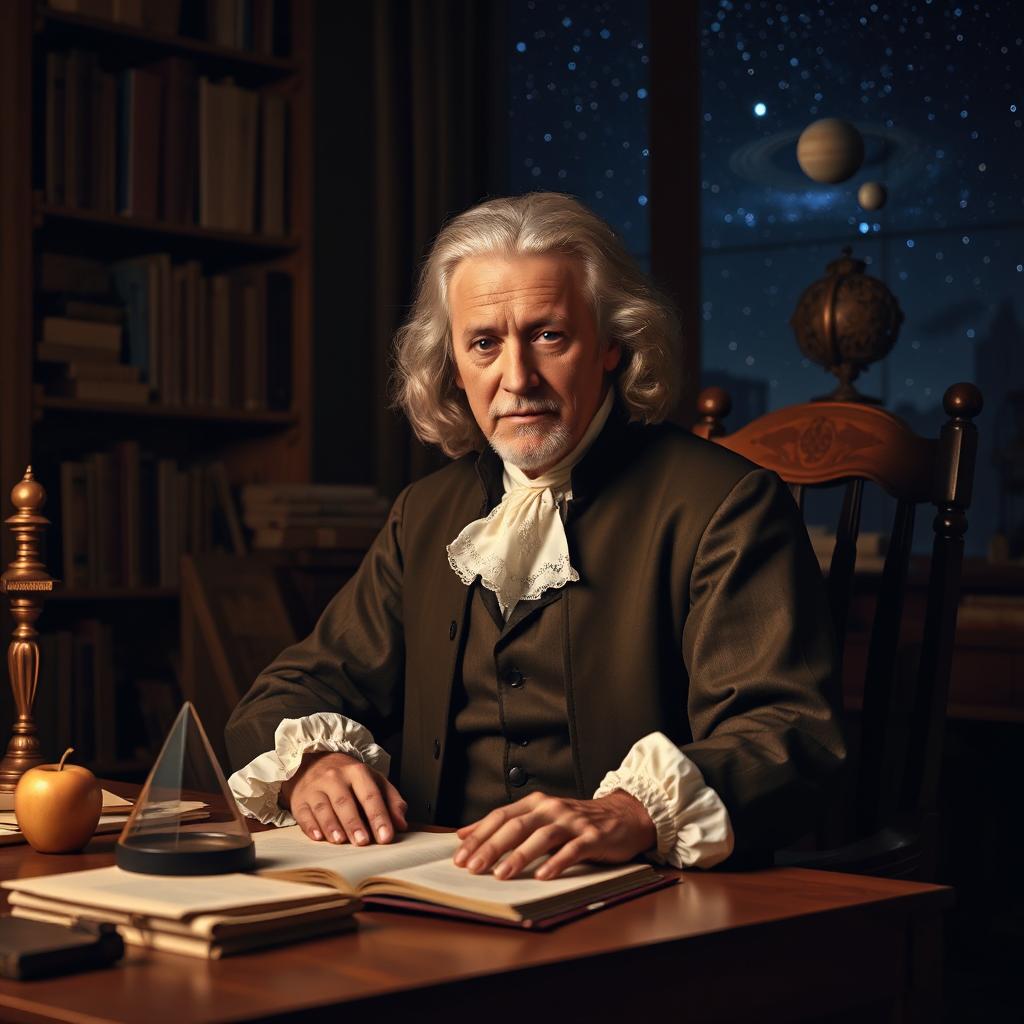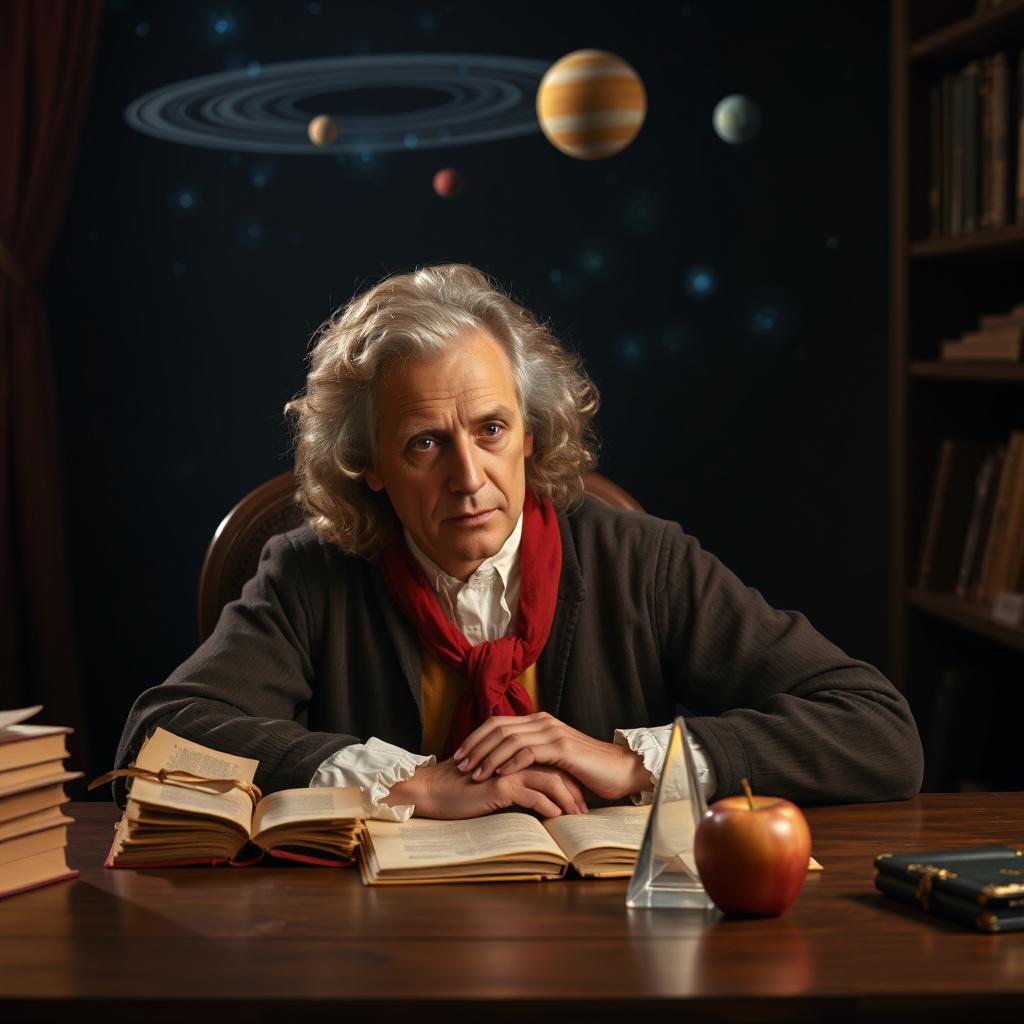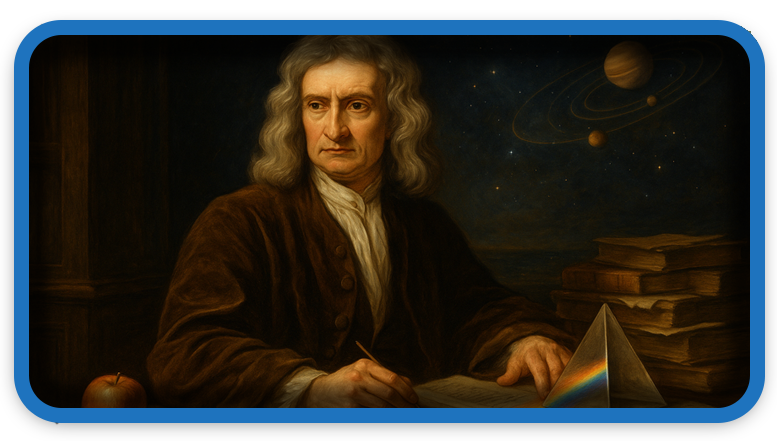⏲️ Estimated reading time: 6 min
Isaac Newton The Life, Discoveries, and Legacy of an Immortal Genius. Isaac Newton, one of the greatest scientists in history, revolutionized science through his laws of motion and gravity, alongside fundamental contributions to mathematics, optics, and natural philosophy. Discover his life, work, and everlasting impact on humanity.
Few names in the history of science carry the same weight as Isaac Newton. Considered one of the founding fathers of the Scientific Revolution, Newton changed the way humanity understands the universe. His laws of motion, the theory of universal gravitation, and groundbreaking contributions to mathematics laid the foundation of modern science.
Childhood and Early Life
Birth and Family
Isaac Newton was born on December 25, 1642 (Old Style calendar) in Woolsthorpe, a small village in Lincolnshire, England. He was born prematurely, and his family feared he would not survive infancy. His father had died before his birth, and his mother, Hannah Ayscough, remarried, leaving young Isaac in the care of his grandmother. This maternal absence deeply marked his emotional world.
Early Education
Newton attended the local village school and later The King’s School in Grantham. There he showed a passion for mechanical inventions, creating sundials, water clocks, and even miniature windmills. Teachers described him as reserved and quiet, but exceptionally curious and brilliant.
University Studies at Cambridge
In 1661, Newton enrolled at Trinity College, Cambridge, where he studied philosophy, mathematics, and natural sciences. He was influenced by the works of René Descartes, Galileo Galilei, and Johannes Kepler.
However, in 1665, the Great Plague forced Cambridge to close, and Newton returned home to Woolsthorpe. This period of isolation, between 1665 and 1667, became known as his “Annus Mirabilis” the year of wonders. During this time, Newton developed the foundations of calculus, formulated his theory of gravitation, and conducted pioneering research in optics.
Newton’s Major Discoveries
1. The Laws of Motion
Newton formulated three fundamental laws of motion, published in 1687 in his masterpiece Philosophiae Naturalis Principia Mathematica:
- Law of Inertia: A body remains at rest or in uniform motion in a straight line unless acted upon by an external force.
- Fundamental Law of Dynamics: The acceleration of a body is directly proportional to the force applied and inversely proportional to its mass.
- Law of Action and Reaction: For every action, there is an equal and opposite reaction.
These laws became the cornerstone of classical mechanics.
2. Universal Gravitation
Inspired, according to legend, by the fall of an apple, Newton demonstrated that the same force that pulls an apple toward Earth also governs the motion of planets. His law of universal gravitation unified celestial and terrestrial physics in one framework.
3. Calculus
Although disputes with Gottfried Wilhelm Leibniz over priority remain one of the greatest controversies in mathematics, Newton had already developed his method of fluxions the foundation of modern calculus. Today, calculus is indispensable in physics, engineering, economics, and computer science.
4. Optics and the Nature of Light
Newton showed that white light is composed of a spectrum of colors, which he proved by passing light through a prism. He also constructed the first practical reflecting telescope, eliminating chromatic aberrations present in refracting telescopes.

Published Works
Principia Mathematica (1687)
This monumental book laid down the foundation of classical physics, presenting Newton’s laws of motion and universal gravitation. It remains one of the most influential works in the history of science.
Opticks (1704)
In this book, Newton presented his experiments with light and color. He proposed a corpuscular theory of light, later complemented by Christiaan Huygens’ wave theory and eventually modern quantum physics.
Newton the Alchemist and Theologian
Beyond mathematics and physics, Newton devoted significant energy to alchemy and theology. He wrote thousands of pages of manuscripts on alchemical experiments, searching for hidden truths about matter and the universe. He also studied biblical prophecies, reflecting his deep religious convictions.
Public Career
In 1696, Newton was appointed Warden of the Royal Mint. Later, as Master of the Mint, he reformed England’s currency and fought against counterfeiters with remarkable efficiency.
In 1703, he became President of the Royal Society, a position he held until his death. Under his leadership, the Royal Society became Europe’s leading scientific institution.
Personality and Controversies
Newton was a solitary and sensitive man, often hostile toward critics. His rivalry with Leibniz over calculus sparked one of the greatest intellectual disputes in history. He also clashed with Robert Hooke and Christiaan Huygens.
Despite his controversies, Newton’s genius elevated him above his rivals.
Later Years and Death
In 1705, Newton was knighted by Queen Anne, becoming Sir Isaac Newton. He lived until the age of 84, passing away on March 20, 1727, in London. He was buried with national honors in Westminster Abbey, an extraordinary recognition for a scientist.
Newton’s Legacy
In Science
Newton’s laws remained unchallenged for more than two centuries until Einstein’s theory of relativity expanded our understanding. Yet even today, engineers, scientists, and astronauts rely on Newtonian mechanics for practical applications.
In Culture
Newton became a symbol of the solitary genius who reshaped human understanding.
In Education
Every physics student in the world begins with Newton’s principles. His name remains inseparable from the very idea of science.
Fun Facts About Newton
- He wrote more about alchemy and theology than about physics.
- He never married and lived a private life.
- He was the first scientist buried in Westminster Abbey.
- He was knighted not for science, but for his administrative work at the Mint.
- He was obsessively hardworking, often forgetting to eat or sleep.

Impact on the Modern World
Newton’s work still influences space exploration, satellite technology, construction engineering, and computer simulations. Without his discoveries, the Industrial Revolution and the Space Age might have been delayed for centuries.
Eternal Legacy
Newton was more than a man of his era. He was a visionary who opened the gates of modern science. His discoveries still shape our daily lives, from the physics behind smartphone sensors to the calculations guiding spacecraft through the solar system.
Newton united heaven and earth through one universal law, proving that the cosmos is governed by order and harmony.
Final Thoughts
The life and work of Isaac Newton remain a testament to human intellect and perseverance. From a fragile child in a small English village, he rose to become one of the greatest geniuses in history. His legacy transcends science, embodying human curiosity, resilience, and the eternal quest for knowledge.
🔔 For more tutorials like this, consider subscribing to our blog.
📩 Do you have questions or suggestions? Leave a comment or contact us!
🏷️ Tags: Isaac Newton, Newton biography, laws of motion, universal gravitation, modern science, mathematics, optics, Principia Mathematica, Royal Society, calculus, history of science
📢 Hashtags: #IsaacNewton, #Science, #Physics, #Gravity, #Mathematics, #Optics, #History, #Knowledge, #Education, #Genius
Only logged-in users can submit reports.
Discover more from HelpZone
Subscribe to get the latest posts sent to your email.

